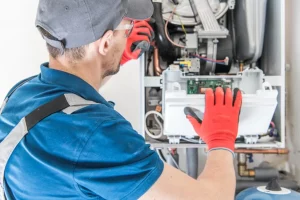
January 29, 2024
There are many benefits to heating your home with an oil-fired heating system. Oil burns hotter than other fuel types, so your home warms up faster. Heat is necessary during Scranton, Pennsylvania’s cold winters, and oil is more efficient, affordable, and tends to be cleaner than other fuels. Yet, like all other appliances, oil-fired heaters break. Here are some common issues you may experience with your oil-fired heater:
- Heater doesn’t turn
- Smokes
- Provides inadequate heat
- Uses too much fuel
- Burners don’t produce flame
The heater not turning on is the most common complaint in oil-fired heaters. Sometimes, all you need to do is find the reset button and press it. Do not press it multiple times, or you may flood the appliance with fuel. If the reset button hasn’t tripped, you may have a problem with the heater’s connection to the thermostat, a dirty pilot light, a fried circuit, or a malfunctioning gas valve.
If the appliance isn’t making enough heat, the oil filter may be clogged, or the fan belt may need replacing. Sometimes, it’s not the unit at all but leaks in the ductwork. If there is smoke, it usually points to a blockage in the combustion chamber, and abnormally high fuel consumption may mean that your appliance is the wrong size for your home. Burners that do not produce a flame result from a nozzle being blocked or faulty.
Another issue with an oil-fired system is that it can turn off suddenly. Shutdowns might be because your heater has run out of fuel. It can result from a faulty thermostat or a filter that needs cleaning. Fuses and wires may also be damaged or loose. If the unit is damaged, a professional should repair them.
Bad smells are another problem with these appliances. The smells may originate in the nozzle, the chimney, or a dirt-clogged heat exchanger. But, again, regular, professional maintenance and troubleshooting can lower the risk of unpleasant odors.
A variety of malfunctions can cause unusual noises from the unit. For example, your heater can have a worn-out belt or motor bearings. The oil burner can be clogged with dirt or air in the lines. When access panels come loose, they can also rattle as the appliance works.
Call Freedom Flow for Service
Your oil-fueled heater needs to work during Scranton’s winters, so don’t hesitate to call for service if you notice that something is wrong. Our professionals are second to none when it comes to repairing, maintaining, or installing your oil-fired heater in the Scranton area. We also perform drain cleaning, leak detection, and service water treatment systems and sump pumps. Call Freedom Flow today to schedule maintenance before winter.